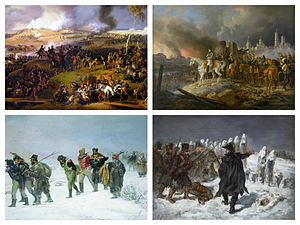1812 Russian campaign
| French Invasion of Russia | |||||||
|---|---|---|---|---|---|---|---|
| Part of the Napoleonic Wars | |||||||
 Clockwise from top left: The Battle of Borodino by Louis Lejeune; The Fire of Moscow by Albrecht Adam; Marshal Ney at the battle of Kaunas by Auguste Raffet; French retreat by Illarion Pryanishnikov |
|||||||
|
|||||||
| Belligerents | |||||||
|
|
|||||||
| Commanders and leaders | |||||||
| Strength | |||||||
| Grande Armée: c. 685,000 |
|
||||||
| Casualties and losses | |||||||
Of these, 50,000 were Austrians and Prussians, 20,000 Poles and 35,000 Frenchmen. |
Deaths: 210,000 | ||||||
Decisive Russian victory
Of these, 50,000 were Austrians and Prussians, 20,000 Poles and 35,000 Frenchmen.
The French invasion of Russia, known in Russia as the Patriotic War of 1812 (Russian: Отечественная война 1812 года, Otechestvennaya Voyna 1812 Goda) and in France as the Russian Campaign (French: Campagne de Russie), began on 24 June 1812 when Napoleon's Grande Armée crossed the Neman River in an attempt to engage and defeat the Russian army. Napoleon hoped to compel Tsar Alexander I of Russia to cease trading with British merchants through proxies in an effort to pressure the United Kingdom to sue for peace. The official political aim of the campaign was to liberate Poland from the threat of Russia. Napoleon named the campaign the Second Polish War to gain favor with the Poles and provide a political pretext for his actions.
The Grande Armée was a very large force, numbering 680,000 soldiers (including 300,000 of French departments). Through a series of long marches Napoleon pushed the army rapidly through Western Russia in an attempt to bring the Russian army to battle, winning a number of minor engagements and a major battle at Smolensk in August. Napoleon hoped the battle would mean an end of the march into Russia, but the Russian army slipped away from the engagement and continued to retreat into Russia, while leaving Smolensk to burn. Plans Napoleon had made to quarter at Smolensk were abandoned, and he pressed his army on after the Russians.
As the Russian army fell back, Cossacks were given the task of burning villages, towns and crops. This was intended to deny the invaders the option of living off the land. These scorched-earth tactics greatly surprised and disturbed the French, as the willingness of the Russians to destroy their own territory and harm their own people was difficult for the French to comprehend. The actions forced the French to rely on a supply system that was incapable of feeding the large army in the field. Starvation and privation compelled French soldiers to leave their camps at night in search of food. These men were frequently confronted by parties of Cossacks, who captured or killed them.
...
Wikipedia
